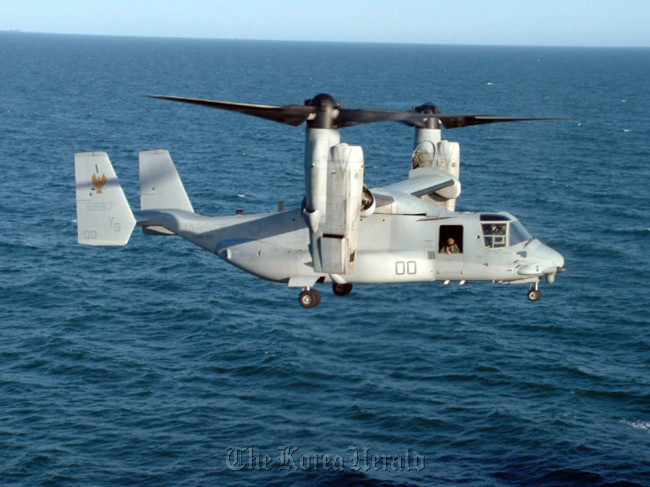Environment, crimes strain U.S. alliance with Korea, Japan
By Korea HeraldPublished : July 12, 2012 - 20:01
Environmental degradation, and accidents and crimes involving American troops have long been sources of friction in U.S. alliances with South Korea and Japan.
Last year, allegations that U.S. soldiers dumped toxic chemicals such as Agent Orange at their bases in Korea decades ago sparked public furor and prompted calls for an environmental inspection of the installations suspected of contamination. A joint U.S.-South Korean investigation subsequently failed to find toxic substances at levels dangerous to human health.
A set of sexual assault cases involving American soldiers last year also caused public anxiety with some opponents of the U.S. military presence calling for their withdrawal.
In Korea, issues involving the U.S. military have taken on political overtones with politicians strictly divided along ideological lines.
A decade ago, an accident in which two school girls were run over by a U.S. military vehicle sparked unprecedented anti-America rallies and led to the election of Roh Moo-hyun, a liberal leader who sought a more equal relationship with Washington.
Last year, allegations that U.S. soldiers dumped toxic chemicals such as Agent Orange at their bases in Korea decades ago sparked public furor and prompted calls for an environmental inspection of the installations suspected of contamination. A joint U.S.-South Korean investigation subsequently failed to find toxic substances at levels dangerous to human health.
A set of sexual assault cases involving American soldiers last year also caused public anxiety with some opponents of the U.S. military presence calling for their withdrawal.
In Korea, issues involving the U.S. military have taken on political overtones with politicians strictly divided along ideological lines.
A decade ago, an accident in which two school girls were run over by a U.S. military vehicle sparked unprecedented anti-America rallies and led to the election of Roh Moo-hyun, a liberal leader who sought a more equal relationship with Washington.

In Japan, a set of environmental issues have triggered tension in its alliance with the U.S.
Residents in Okinawa, Japan, have long argued that the relocation of the U.S. Marine Corps Air Station Futenma to Camp Schwab in Nago of the same prefecture would endanger dugong, a marine mammal regarded as vulnerable to extinction.
Since the two allies agreed to move the air base to a site near Henoko Bay in 2006, opponents have called on the Tokyo government to cancel the plan, saying that the extensive land reclamation work for the relocation could jeopardize the rare species of sea cow.
The population of the creature in waters around the southernmost island is said to be fewer than 50.
Dugong has been classified as “critically endangered” on the Tokyo government’s list of endangered species. In 2006, Japan signed an agreement with the U.S. to relocate the Futenma air station in Ginowan, Okinawa, to a site near Henoko Bay in Nago.
The latest tension in the U.S.-Japan alliance was sparked due to America’s ongoing deployment of the new MV-22 Osprey transport aircraft to Okinawa.
Citing a series of accidents involving Osprey aircraft, Okinawans have expressed strong safety concerns and opposed the deployment. The latest crash took place last Month in Florida during a training mission, injuring five crew members aboard.
Okinawa Governor Hirokazu Nakaima threatened earlier this month to call for the shutdown of all U.S. bases in his prefecture if the U.S. pushed ahead with the planned deployment of the controversial aircraft.
The U.S. has already sent the new fleet to Okinawa to replace aging CH-46 helicopters. The U.S. plans to send 12 Ospreys first to the Marin Corps Air Station Iwakuni in Yamaguchi Prefecture in late July. They would then be transferred to the Futenma base in Okinawa in mid-August.
The U.S. military says that the new aircraft will strengthen its commitment to the defense of Japan, and perform humanitarian assistance and disaster relief operations. The Osprey is a multi-mission aircraft with both vertical takeoff and landing, and short takeoff and landing capability.
By Song Sang-ho (sshluck@heraldcorp.com)
-
Articles by Korea Herald












![[Today’s K-pop] BTS pop-up event to come to Seoul](http://res.heraldm.com/phpwas/restmb_idxmake.php?idx=644&simg=/content/image/2024/04/17/20240417050734_0.jpg&u=)





![[KH Explains] Hyundai's full hybrid edge to pay off amid slow transition to pure EVs](http://res.heraldm.com/phpwas/restmb_idxmake.php?idx=652&simg=/content/image/2024/04/18/20240418050645_0.jpg&u=20240418181020)

![[Today’s K-pop] Zico drops snippet of collaboration with Jennie](http://res.heraldm.com/phpwas/restmb_idxmake.php?idx=642&simg=/content/image/2024/04/18/20240418050702_0.jpg&u=)